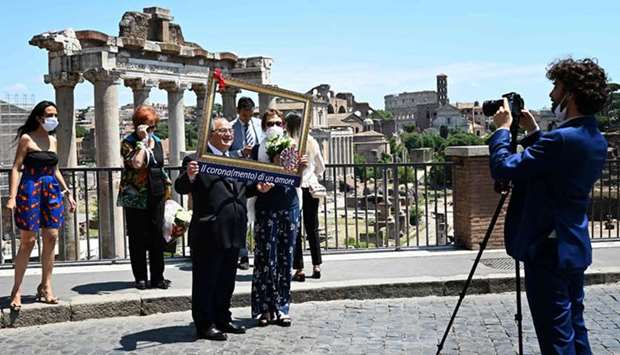As the weather warms up and restrictions to contain the novel coronavirus are lifted, Italy’s politicians advised citizens to take care and maintain health precautions, warning that otherwise they could risk another wave of infections.
Beaches throughout the country are due to reopen today but were opened early in many regions.
Images on television of southern Italy showed beaches in Sicily, for example, were packed and few sunbathers were wearing protective masks.
In Rome, Naples, Genoa and other cities, young people headed to bars in the evenings and many stood in groups without observing social distancing measures or wearing face masks.
Politicians in Rome and throughout the country responded with concern.
“After being stuck at home for so long, young people have lost sight of the limits they had been sticking to,” said Interior Minister Luciana Lamorgese in an interview with broadcaster RTL102.5 on Saturday.
In some cities, mayors closed bars in the early evening, and the authorities in Rimini, a resort on the Adriatic, announced spot checks to ensure illegal gatherings were not taking place.
Italy, one of the countries most affected by the virus, eased its lockdown on May 18, allowing restaurants, bars and shops to reopen, as long as patrons follow hygiene regulations.
Gyms are due to reopen today.
Tourists from abroad may be allowed to enter the country as of June 3.
Throughout the country, 230,000 people have tested positive for the coronavirus and almost 33,000 have died.
Experts however believe the number of cases may be significantly higher, and mass antibody testing is due to start today.
Some 150,000 people are to be tested to identify those who may have been infected with the virus but without showing any symptoms, or only minor ones.
The voluntary testing was announced in April.
It to be run by the health ministry and the statistics authorities together with the Red Cross, the ministry said at the weekend.
The blood tests are to be carried out in 2,000 locations.
Those selected as representative are to be contacted by telephone and asked to take part.
Their data is to be anonymised.
Evidence now suggests that the virus had reached the country weeks before the first cases were detected in Lombardy in February.
Filippo Ansaldi, an expert from the Liguria region’s health authorities, said that studies indicated the first cases may have occurred in Genoa as early as December 8, in remarks to local television.
Spain’s authorities announced antibody testing of 90,000 people in April.
In Germany, plans to test 30,000 people have been postponed until September.

A newly-married couple pose for a picture yesterday in front of the Roman forum in Rome, as the country eases lockdown measures taken to curb the spread of the coronavirus. The text on the photo frame reads ‘Crown(ing) of love’, a play on the Italian word for both ‘crown’ and the coronavirus.
